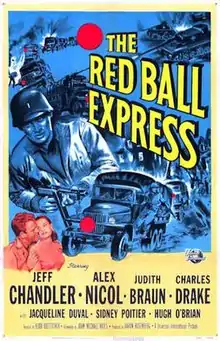| Red Ball Express | |
|---|---|
 | |
| Directed by | Budd Boetticher |
| Screenplay by | John Michael Hayes |
| Story by | Marcy Klauber (as Marcel Klauber) William Grady Jr. (as Billy Grady Jr.) |
| Produced by | Aaron Rosenberg |
| Starring | Jeff Chandler Alex Nicol |
| Cinematography | Maury Gertsman |
| Edited by | Edward Curtiss |
| Color process | Black and white |
Production company | Universal Pictures |
| Distributed by | Universal Pictures |
Release dates |
|
Running time | 83 minutes |
| Country | United States |
| Language | English |
| Box office | $1.5 million (US rentals)[1] |
Red Ball Express is a 1952 American World War II war film directed by Budd Boetticher and starring Jeff Chandler and Alex Nicol, featuring early screen appearances by Sidney Poitier and Hugh O'Brian. The film is based on the Red Ball Express convoys that took place after the D-Day landings in Normandy in June 1944.[2]
Plot
In August 1944, Patton's Third Army has advanced so far following the D-Day invasion toward Paris that it cannot be supplied. To maintain the momentum, Allied headquarters establishes an elite military truck route. One racially integrated platoon of this Red Ball Express encounters private enmities, German resistance, minefields and increasingly perilous missions.
Lt. Chick Campbell, head of the platoon, clashes with Sgt. Red Kallek over an incident that occurred when they were civilian truck drivers that resulted in Kallek's brother's death.
Cast
- Jeff Chandler as Lieutenant Chick Campbell
- Alex Nicol as Sergeant "Red" Kallek
- Charles Drake as Private Ronald Partridge / The Narrator
- Judith Braun as Joyce McClellan
- Sidney Poitier as Corporal Andrew Robertson
- Jaqueline Duval as Antoinette Dubois
- Bubber Johnson as Private "Taffy" Smith
- Davis Roberts as Private Dave MCord
- Hugh O'Brian as Private Wilson
- Frank Chase as Private Higgins
- Cindy Garner as Kitty Walsh
- Gregg Palmer as Tank Lieutenant
- John Hudson as Tank Sergeant Max
- Jack Kelly as Heyman
- Howard Petrie as Major General Lee Gordon
The character of General Gordon appears to have been based on General Patton, although Patton is also specifically mentioned in the film. Major General Frank Ross, who was in charge of the real Red Ball Express, acted as a technical adviser.[3]
Controversy
Because of the high percentage of black drivers in the Red Ball Express operation, the Department of Defense insisted to Universal that the film be modified so that "the positive angle be emphasized" regarding race relations. Director Budd Boetticher claimed:
The army wouldn't let us tell the truth about the black troops because the government figured they were expendable. Our government didn't want to admit they were kamikaze pilots. They figured if one out of ten trucks got through, they'd save Patton and his tanks.[4]
References
- ↑ 'Top Box-Office Hits of 1952', Variety, January 7, 1953
- ↑ Budd Boetticher: The Last Interview Wheeler, Winston Dixon. Film Criticism; Meadville Vol. 26, Iss. 3, (Spring 2002): 52-0_3.
- ↑ Jeremy Arnold, 'Red Ball Express', Turner Classic Movies accessed 5 August 2012
- ↑ Sean Axmaker, 'Ride Lonesome: The Career of Budd Boetticher', Senses of Cinema 7 February 2006 accessed 25 June 2012
External links
- The Red Ball Express, YouTube
- Red Ball Express at IMDb
- Red Ball Express at TCMDB
- Review of film at Variety